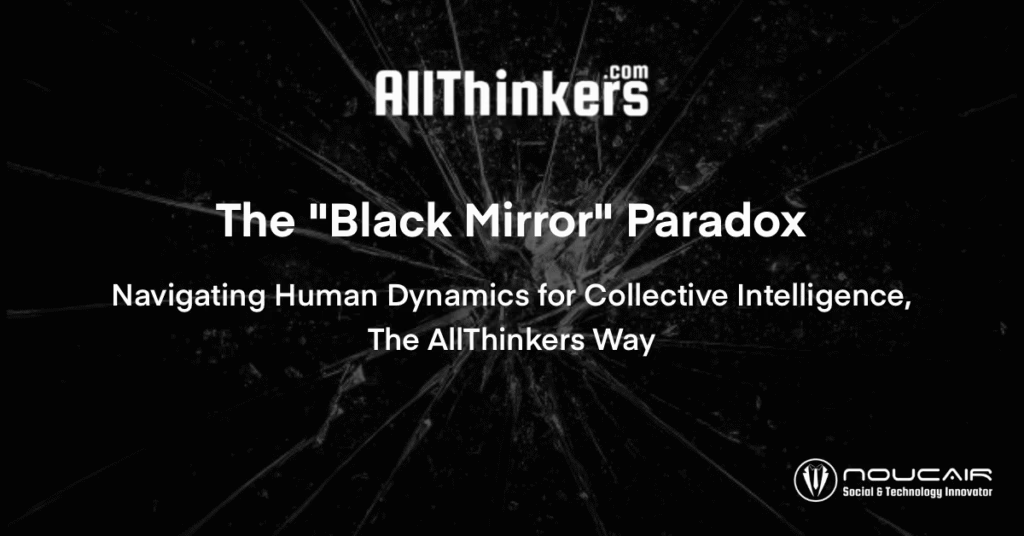The Intricacies of Human Collaboration
In the pursuit of collective intelligence and organizational excellence, teams often encounter complexities that can feel as intricate and strategically charged as a game from a “Black Mirror” episode. As NOUCAIR B, a Visionary Innovator and CEO of AllThinkers.com and Andromedas.com, aptly observes, navigating the diverse personalities within a group, particularly those who perceive themselves as “smarter” or exhibit challenging traits like arrogance or introversion, can indeed create a “bad atmosphere” and hinder effective “team work”. This article delves into the “Black Mirror” paradox of human dynamics – the need for strategic navigation in complex social systems – while firmly rooting our approach in the ethical principles of influence and the enhancement of Collective Intelligence, as championed by the AllThinkers Unified Theory.
1. The Human Chessboard: Understanding the “Game” of Collective Dynamics
The analogy of a “Black Mirror” game, while provocative, highlights the profound strategic thinking required to maneuver through intricate social scenarios. It acknowledges that human interaction, especially within teams, is not always straightforward; it can involve hidden motivations, power dynamics, and communication challenges. Individuals who think they are “smarter than the others” and exhibit arrogance or introversion can disrupt flow, create tension, and inadvertently undermine the very collective output they are part of. Recognizing this “game” means acknowledging the need for a sophisticated approach, one that moves beyond simple directives to truly understand the players and the playing field.
2. Beyond Dystopia: Ethical Influence vs. Negative Manipulation
Crucially, the AllThinkers approach diverges sharply from any dystopian “Black Mirror” narrative of control or self-serving manipulation. Our objective is not to negatively “manipulate” individuals, but to ethically and strategically influence their behaviors to re-channel their energies towards productive collaboration. This demands a profound application of the “Depth” component within True Intelligence (
IT=Speed×Depth
), especially in areas like Emotional Intelligence (EQ), Ethical Alignment, and Systemic Understanding. The “game” becomes one of elevation:
- Understanding Motivations: Deciphering the underlying reasons for challenging behaviors (e.g., insecurity, fear, misunderstanding).
- Shaping the Environment: Designing communication structures and team protocols that intrinsically encourage positive contributions and psychological safety.
- Guiding Towards Shared Goals: Artfully redirecting individual energies and perceived self-interest towards the common good of the collective.
3. Strategic Moves for Collective Growth: An Algorithmic Approach to Human Dynamics
To effectively navigate this human chessboard and enhance collective intelligence, we employ strategic “moves” that are both systematic and empathetic:
- 1. Deep Empathy and Root Cause Analysis (Depth in Action): Instead of reacting to surface behaviors (e.g., arrogance or withdrawal), we strive to understand their origins. This involves active listening, asking probing questions, and seeking to uncover underlying insecurities or unmet needs. Acknowledging valid points, even from challenging individuals, can disarm defensiveness.
- 2. Clarity and Protocol Implementation (Speed in Execution, Depth in Design): Establish clear communication guidelines, meeting protocols, and decision-making processes. A strong facilitator ensures equitable participation, manages interruptions, and keeps discussions focused on shared objectives. Structured brainstorming techniques can give every voice, including quieter introverts, an opportunity to contribute without dominance.
- 3. Performance-Based Feedback (Ethical Alignment): Address specific behaviors and their impact on team dynamics and output, rather than personal character. This objective feedback (e.g., “When you interrupt, it hinders the team’s ability to hear all perspectives”) is crucial for growth and accountability.
- 4. Reinforce Shared Purpose (Systemic Understanding): Constantly bring the team back to the collective goal and how individual behaviors either contribute to or detract from it. Remind everyone that the strength of the “one hand” is greater than any individual part.
- 5. Lead by Example and Resilience: As a leader, your own “Master Mindset”—your ability to be “original and solid, strength full; then brave”, and to “start every time from the scratch”—serves as the most powerful blueprint. Demonstrate the collaborative behaviors you wish to see and never yield to the negative forces that seek to undermine progress.
Conclusion: Winning the “Game” for Humanity’s Potential
The “Black Mirror” analogy serves as a potent metaphor for the complexities of modern collective dynamics. Yet, the AllThinkers vision transforms this challenging “game” into an opportunity for profound growth. By applying deep analytical insight, unwavering emotional intelligence, and strategic, ethical influence, we can transcend the pitfalls of individual ego and foster environments where collaboration flourishes. This is not about control, but about creating conditions for mutual empowerment and unlocking the full, boundless potential of collective intelligence. In navigating these human dynamics, we play the “game” not for individual dominance, but for the elevated future of all.


